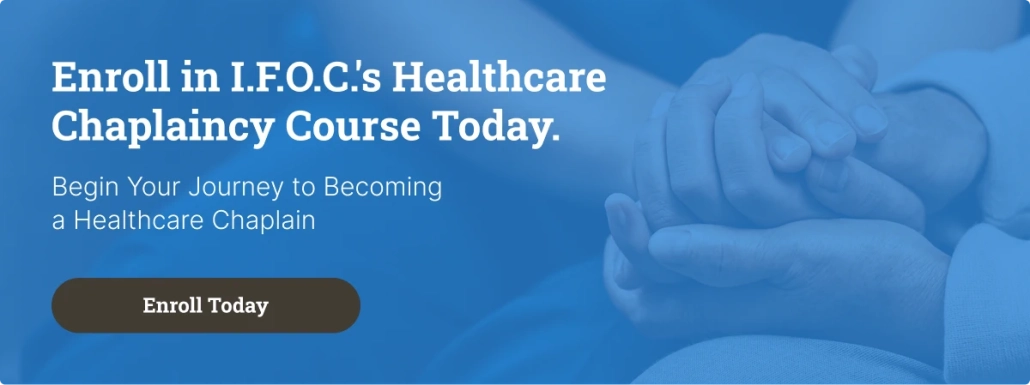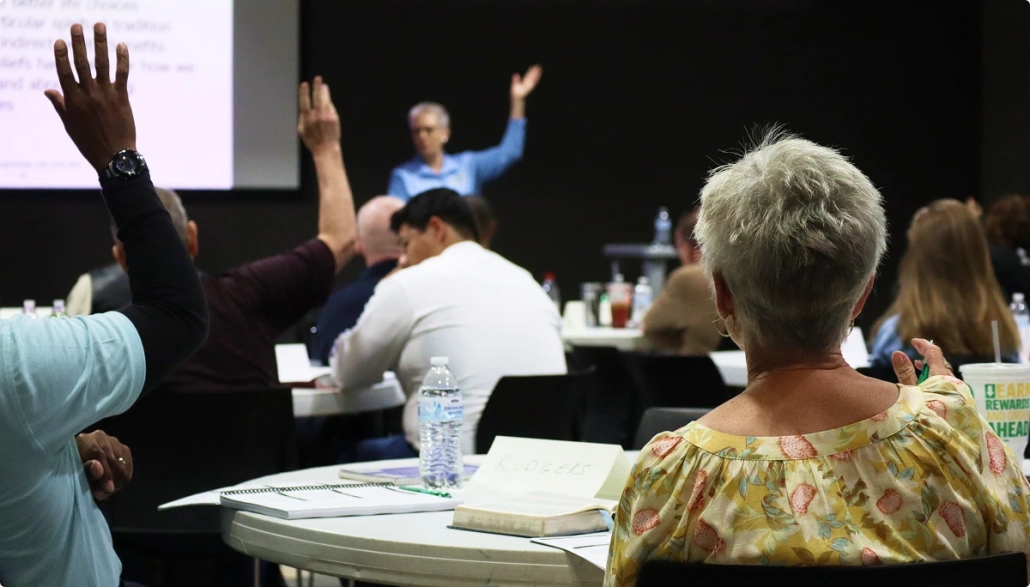What is a Healthcare Chaplain, and How Do I Become One?
Healthcare settings can be some of the most emotionally and physically demanding environments. Medical professionals, patients, and their families navigate the highs and lows of life-and-death situations every day. But what happens when the emotional and spiritual needs of those involved are left unmet?
As our country faces a rising mental health crisis, it’s clear that tending to people’s emotional needs is just as vital as addressing their physical health. In healthcare settings, where the stakes are high, focusing on emotional well-being has never been more essential. Having spiritual support can make all the difference, helping to ensure that no one feels alone or overwhelmed on their journey. This is where healthcare chaplains can help.
Healthcare chaplains serve patients, families, and medical teams by providing a unique blend of guidance and support during some of life’s most challenging times. Their responsibilities range from providing emotional and spiritual care to collaboration with healthcare professionals, ensuring that the holistic needs of individuals are met.
With the proper training and certification, an effective healthcare chaplain can partner with counselors, social workers, and hospice to lift the burden of care from hospital and medical staff and walk with patients in times of crisis and change.
If you’ve ever considered pursuing this rewarding path, understanding the necessary steps to become a healthcare chaplain is essential. In this article, we’ll explore:
- The role of chaplains in different healthcare settings
- The key responsibilities healthcare chaplains hold
- Outline the educational and training pathways to begin your fulfilling journey to chaplaincy

Understanding the Role of a Healthcare Chaplain
Healthcare chaplains are key figures who integrate spiritual care into the treatment of patients, serving as a compassionate support system for patients, families, and healthcare professionals. They help people navigate the emotional and spiritual complexities that arise during health crises, offering comfort, counseling, and a calming presence during some of life’s most challenging moments.
What is a Healthcare Chaplain?
A healthcare chaplain is a spiritual care provider who operates within healthcare systems. Whereas licensed counselors or social workers might focus on mental health or resource connection, chaplains dedicate themselves to offering spiritual guidance, facilitating grief counseling, and engaging in spiritual interventions.
Types of healthcare chaplains include:
- EMS Chaplains: These chaplains work with first responders, such as EMTs and medics, offering crisis intervention during emergencies. They also provide support to families and victims of traumatic events.
- Hospital Chaplains: Hospital chaplains work within the medical team, splitting their time between patient care—providing spiritual guidance during illness—and staff support, helping healthcare professionals manage the emotional toll of their work.
- Hospice Chaplains: Specializing in end-of-life care, hospice chaplains provide spiritual care to patients and their families during this deeply emotional time, helping everyone find peace and comfort.
- VA Chaplains: These chaplains offer spiritual care to veterans and their families, addressing the unique challenges faced by those who have served in the military.
Each role plays an integral part in nurturing the church body, and understanding these distinctions helps clarify the place of chaplains within the framework of a culture of care in the church.
Importance of Spiritual Support in Healthcare
Spiritual support within healthcare is an indispensable component of comprehensive care. Hospital chaplains play a crucial role in providing emotional and spiritual guidance that complements medical treatment.
In fact, studies have shown that spiritual commitment can enhance recovery from illness and surgery. For instance, heart transplant patients who engaged in religious activities exhibited better compliance with follow-up treatment and improved physical functioning. Another study found that providing spiritual care to patients with serious illness has been associated with better end-of-life outcomes.
These are a few of the many findings that emphasize the importance of spiritual care as an important part of the healing journey.

Key Responsibilities of Healthcare Chaplains
Hospital chaplains and healthcare chaplains play a vital role in various healthcare settings, providing spiritual guidance and support not just to patients but also to their families and healthcare professionals. They integrate themselves into multidisciplinary care teams, ensuring holistic patient care by addressing the unseen yet crucial spiritual and emotional dimensions of healing and coping.
Providing Emotional and Spiritual Care
Healthcare chaplains are entrusted with offering spiritual care that caters to a wide spectrum of faith traditions and beliefs. They provide essential spiritual counseling and emotional support to patients facing severe medical challenges, working to alleviate fears and anxieties that can often accompany hospital stays.
Professional chaplains engage in meaningful and empathetic conversations, regardless of the patient’s or professional’s religious preferences. In doing so, chaplains help individuals to find peace, strength, and resilience amidst their journeys. This care extends to bereavement counseling, helping families navigate grief and loss during difficult times.
Collaborating with Medical Professionals
Healthcare providers often face emotional burnout and stress. Chaplains are there to offer emotional support to doctors, nurses, and other medical staff. By helping them process their feelings, chaplains reduce burnout and help create a healthier, more effective work environment.
Supporting Patients and Families
Chaplains also provide support to families, helping them cope with the emotional stress of caring for a loved one in a healthcare setting. They offer guidance during difficult decisions and help families find comfort through faith and community.

Steps to Becoming a Healthcare Chaplain
Becoming a healthcare chaplain requires a combination of education, experience, and a deep desire to serve those needing spiritual care. The journey varies depending on the specific area of healthcare chaplaincy (hospital, hospice, EMS, etc.), but the general steps to pursue a career in this field typically include the following:
Education and Theological Training
The road to healthcare chaplaincy doesn’t always include formal education, but some begin their journey by earning a seminary degree or pursuing theological education. This is because a seminary provides the foundational knowledge of various religious beliefs, ethics, and pastoral care principles. Next, hospital chaplains can supplement their seminary training with Clinical Pastoral Education (CPE), which is often required by larger hospitals and teaching hospitals to ensure chaplains can document spiritual care interactions in medical charts. CPE is required by some hospitals for employment as a hospital Chaplain. Other hospitals do not have this requirement. CPE is specific to hospital chaplaincy.
While these programs and training are valuable – and often, required – they heavily focus on spiritual care work, they don’t necessarily teach the practical, hands-on skills needed in healthcare settings.
Specialized Training with the I.F.O.C.
Even where CPE is not required, it is highly recommended that healthcare chaplains receive additional training or certifications in grief counseling, palliative care, or trauma. Depending on your career interests, you may want to specialize in a particular area of healthcare chaplaincy, such as hospice care, EMS chaplaincy, or working with first responders. Each field requires different levels of expertise and trust-building. For example, hospice chaplains typically work with patients at the end of life and their families, providing support during a difficult time.
This is where a chaplaincy program, like the International Fellowship of Chaplains (I.F.O.C.), can be extremely beneficial to prospective hospital chaplains. The I.F.O.C. offers specialized licensing and a supportive network for chaplains.
These programs enhance your professional journey by equipping you with essential skills in spiritual care and granting you a recognized credential valued in and beyond healthcare.
Volunteer Work and Entry-Level Positions
One way to gain experience and build a network in healthcare chaplaincy is by volunteering.
Many hospitals, hospices, and healthcare organizations welcome volunteers to provide spiritual care. Volunteering allows you to interact with patients, staff, and families, helping you develop your chaplain skills and build trust within the healthcare team. In some cases, volunteer chaplains may transition into paid positions, especially in smaller healthcare facilities with a high demand for chaplains but fewer resources to hire full-time staff.
Network and Build Trust
Chaplaincy work is deeply rooted in building relationships and trust with patients, families, and healthcare staff. Whether you’re working as a hospital chaplain, hospice chaplain, or first responder chaplain, developing a strong rapport with the community is essential. As one of the first steps, you’ll need to invest time into connecting with patients and their families, as well as the staff you work alongside. Trust and credibility are built through consistent, compassionate service.
Continued Education and Self-Reflection
Healthcare chaplains are encouraged to continue their education throughout their careers. This includes participating in professional development programs, attending workshops, or seeking out peer support groups.
Chaplains also engage in personal reflection to improve their effectiveness in providing spiritual care and ensure they are supporting their own well-being in a high-stress environment.

Essential Skills for Effective Healthcare Chaplaincy
Starting the journey to becoming a healthcare chaplain goes beyond just having the right academic credentials; it’s also about nurturing a mix of essential people skills. Whether you find yourself in a busy hospital, a corporate environment, or a variety of unique settings, being a healthcare chaplain calls for a varied skill set to offer heartfelt spiritual care.
Communication and Active Listening
As a chaplain, you’ll find it essential to listen carefully to patients, their families, and healthcare professionals, creating a welcoming space for them to share their feelings and concerns. This kind of thoughtful listening is more than just catching the words spoken — it’s about really getting to the emotions and context behind them.
Empathy and Compassion
A chaplain must be able to genuinely connect with individuals from different faith traditions and support them through times of crisis, bereavement, or spiritual uncertainty. This involves not only understanding but also appreciating the emotional experiences of those they serve. Providing pastoral counseling, bereavement counseling, and even staff counseling requires a deep well of empathy, allowing chaplains to offer comfort in high-stress times.
Cultural Competence
Cultural competence is essential for professional chaplains today. Healthcare environments are wonderfully diverse, bringing together a rich mix of cultural, religious, and personal identities. As a chaplain, it’s important to be culturally aware and sensitive, ensuring that the pastoral care you provide respects and honors the unique beliefs and practices of every patient and their family.

Become a Licensed Healthcare Chaplain Through I.F.O.C. Today
Being a healthcare chaplain is more than just a job or a volunteer position; it’s a heartfelt calling to offer compassion and support to others when they need it the most. They play a vital role in providing spiritual support and guidance within diverse healthcare environments. They offer pastoral care, bereavement counseling, and spiritual guidance to patients, families, and healthcare staff.
If you feel called to serve as a healthcare chaplain, join the I.F.O.C. International Fellowship of Chaplains and complete the Healthcare Chaplains course. This course is a great place to start if you’re exploring your next steps as a volunteer or full-time healthcare chaplain. For over 25 years, I.F.O.C. has credentialed thousands of Christian chaplains worldwide, equipping them for impactful ministry.
Start your journey today and become a beacon of hope and healing in the healthcare community.

